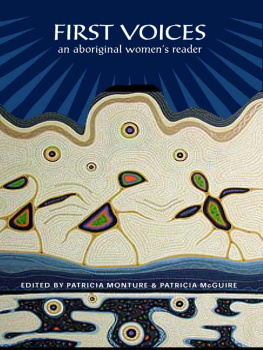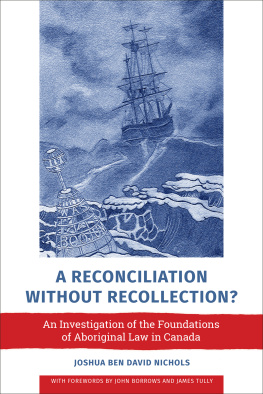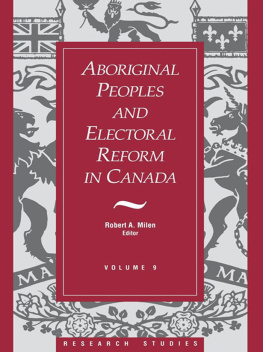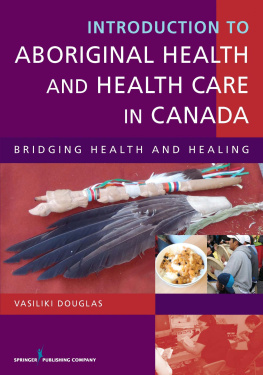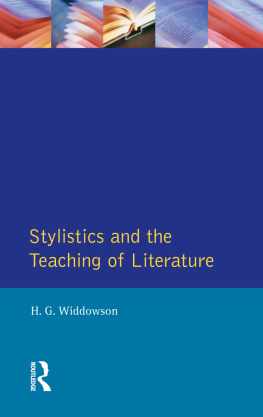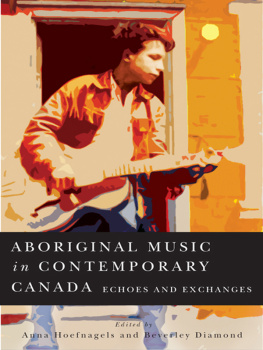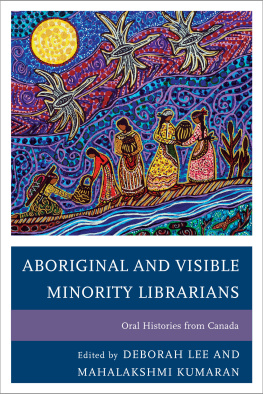Approaches to Aboriginal Education in Canada
Approaches to Aboriginal Education in Canada
Searching for Solutions
Frances Widdowson and Albert Howard, editors
Copyright 2013 Frances Widdowson and Albert Howard
13 14 15 16 17 5 4 3 2 1
Excerpts from this publication may be reproduced under licence from Access Copyright, or with the express written permission of Brush Education Inc., or under licence from a collective management organization in your territory. All rights are otherwise reserved and no part of this publication may be reproduced, stored in a retrieval system, or transmitted in any form or by any means, electronic, mechanic, photocopying, digital copying, scanning, recording or otherwise, except as specifically authorized.
Brush Education Inc.
www.brusheducation.ca
Cover design: Carol Dragich, Dragich Design; Illustration of wampum pattern: Julia
Jungwirth; Photo of braid pattern: Zheng Dong | Dreamstime.com
Copy edit: Kirsten Craven
This book collects previously published articles in their original forms. Wherever possible, we have updated and edited citations for usefulness and consistency. Where updating was not possible, we have included the authors original citation information for your reference.
Printed and manufactured in Canada
Library and Archives Canada Cataloguing in Publication
Approaches to Aboriginal education in Canada : searching for solutions / Frances Widdowson and Albert Howard, editors.
Includes bibliographical references.
Issued in print and electronic formats.
ISBN 978-1-55059-456-0 (pbk.).ISBN 978-1-55059-457-7 (epub).ISBN 978-1-55059-476-8 (pdf).ISBN 978-1-55059-477-5 (mobi)
1. Native peoplesEducationCanada. I. Widdowson, Frances, 1966-, editor of compilation II. Howard, Albert, editor of compilation
E96.2.A66 2013 371.829'97071 C2013-902688-6 C2013-902689-4
Produced with the assistance of the Government of Alberta, Alberta Multimedia Development Fund. We also acknowledge the financial support of the Government of Canada through the Canada Book Fund for our publishing activities.


Dedication
In Memoriam
Larry Gaynor
19392010
Contents
VERNA J. KIRKNESS
VERNA ST. DENIS
MAI NGUYEN
WAYNE GORMAN
JOHN B. FRIESEN AND ANTHONY N. EZEIFE
BLAIR STONECHILD
LINDA GOULET AND YVONNE MCLEOD
JOHN RICHARDS
JERRY WHITE, NICHOLAS SPENCE, AND PAUL MAXIM
MICHAEL MENDELSON
CALVIN HELIN AND DAVE SNOW
JUDY HARDES
ROBERT MCGHEE
ALBERT HOWARD WITH FRANCES WIDDOWSON
ELIZABETH RATA
FRANCES WIDDOWSON
JOHN R. MINNIS
FRANK DEER
DAVID NEWHOUSE
FRANCES WIDDOWSON
DAVID NEWHOUSE
Acknowledgements
There are many people who should be thanked for assisting us with this project.
First of all, we would like to thank a number of people at Mount Royal University for providing a scholarly environment where open and honest debate is encouraged, not suppressed. These people include Duane Bratt and Bruce Foster, the present and previous chairs of the Department of Policy Studies, Manuel Mertin and Sabrina Reed, the previous dean and previous associate dean of the Faculty of Arts, and Robin Fisher (the previous provost and vice-president, academic). All of these individuals were instrumental in supporting the Aboriginal policy forums where Aboriginal education policy was debated. Miriam Carey also provided guidance that was helpful in developing the Bertrand Russell quadrant in the Exchanges section of the book. Elaine Mullen contributed to the development of our ideas about critical thinking and their application to the introduction. Walter Bruno has been a great source of support in encouraging the free exchange of ideas about Aboriginal policy and identity politics in general. Jeffrey Keshen, the new dean of Arts, also should be commended for encouraging a climate of civil debate at Mount Royal University.
There are also a number of political scientists to be thanked for encouraging open debate on Aboriginal policy. These include Janet Ajzenstat, Kathy Brock, Alan Cairns, Katherine Fierlbeck, Tom Flanagan, Rhoda Howard-Hassmann, and Leo Panitch.
Furthermore, David Newhouse and Elizabeth Rata are thanked for contributing original work to this volume. Both scholars have been very helpful and open in sharing their thoughts concerning Aboriginal education.
We would like to thank the students in Widdowsons segment of Policy Studies 5010 (Selected Topics in Public Policy), upon which this book was modelled. They have been an inquisitive group, whose questions contributed to our investigation of this topic. Tom Widdowsons comments on the manuscript were especially helpful.
Finally, special gratitude is owed to Fraser Seely for encouraging us to take on this project and to Lauri Seidlitz for her organizational skills as managing editor. They have made our experience working with Brush Education stimulating and enjoyable.
Introduction
Hunting Assumptions in the Search for Solutions
For a teacher to mandate in advanceeither explicitly or implicitlythat only one ideological interpretation or outcome is permitted in a discussion or assignment is to contradict a fundamental tenet of critical thinking. That tenet holds that all involvedincluding teachersmust always be open to reexamining the assumptions informing their ideological commitments.
(Brookfield, 2012, p. 134)
On February 25, 2010, we travelled to Edmonton, Alberta, to give a presentation at the Greater Edmonton Teachers Convention Association (GETCA). The event would impress upon us the constraints on honest discussions about Aboriginal education, eventually leading to our decision to edit this volume.
The speaking engagement, to occur the following day, was the result of an invitation from Hope Knudsen, the president of the association. Ms. Knudsen had heard one of us (Frances Widdowson) being interviewed by Michael Enright about our book Disrobing the Aboriginal Industry: The Deception behind Indigenous Cultural Preservation. After listening to Widdowsons arguments, Knudsen thought our research and observations would be of great interest to teachers (Knudsen, personal communication, August 5, 2009). Consequently, she asked Widdowson to make a submission to the convention, and the proposed talk, Speaking Frankly about Aboriginal Education, was added to the program.
Upon checking into our hotel, we received a message inviting us to have a drink with conference organizers that evening. We were informed during the meeting that GETCA was under pressure to have Widdowson excluded from the program. Fortunately, the association was standing firm but was concerned about the reception Widdowson might receive; Widdowson assured the convention organizers that she was not worried and hoped that her presence would encourage much needed debate on Aboriginal education. It was then decided that another session, presented by an Aboriginal member of the association, Patrick Loyer, would be cancelled so that he could comment on Widdowsons speech (presumably so that GETCA could meet the opponents demands).






